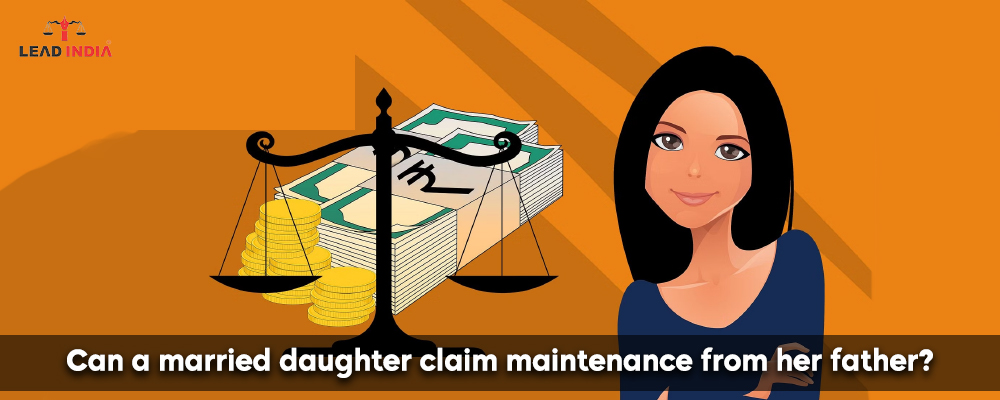Over time, the legal framework in India pertaining to maintenance rights has changed to reflect the evolving nature of familial connections. One important question that frequently comes up is if a married daughter can get maintenance from her father. This inquiry explores the relationship between married daughters’ rights and family law in a society that is undergoing radical transformation.
Traditionally, Indian society adhered to patriarchal norms, where the financial responsibility of daughters shifted upon marriage. However, with progressive legal reforms and changing social attitudes, the legal system has sought to address the economic vulnerability of married daughters.
Need A Legal Advice
The internet is not a lawyer and neither are you. Talk to a real lawyer about your legal issue

Legal Provisions
The primary legal instrument that governs maintenance rights in India is the Code of Criminal Procedure, 1973, and the Hindu Adoption and Maintenance Act, 1956. Under these statutes, several provisions extend the right to maintenance to various family members, including married daughters.
Section 125 of the Code of Criminal Procedure, 1973
This section empowers a married daughter to claim maintenance from her father if she is unable to maintain herself. The provision recognizes the moral and legal obligation of a father to provide financial support to his daughter, irrespective of her marital status.
Hindu Adoption and Maintenance Act, 1956
Under this Act, a married daughter is considered a dependent and is entitled to claim maintenance from her father. The Act emphasizes the duty of a Hindu father to maintain his daughter, whether married or unmarried, provided she is unable to support herself.
Grounds for Claiming Maintenance of Married Daughter
For a married daughter to successfully claim maintenance from her father, certain conditions must be met:
Inability to Maintain Herself
The daughter must demonstrate that due to various circumstances, such as unemployment, illness, or other valid reasons, she is unable to maintain herself financially.
Father’s Financial Capacity
The court will consider the financial capacity of the father to provide maintenance. The obligation is not absolute but depends on the father’s ability to support his daughter.
Reasonable Needs
The daughter must establish that the maintenance claimed is reasonable and necessary for her subsistence, taking into account factors like lifestyle, social status, and living conditions.
Judicial Precedents: Role of the Judiciary
Several landmark judgments have clarified and reinforced the maintenance rights of married daughters in India. One notable case is Abdul Razak Khan v Fatima, where the Supreme Court held that a father’s obligation to maintain his daughter persists even after her marriage. The court emphasized the humanitarian and constitutional aspects of providing financial support to married daughters.
Challenges and Controversies
Despite legal provisions and judicial pronouncements, there are challenges and controversies surrounding the enforcement of maintenance rights for married daughters in India.
- Deep-rooted societal norms and stereotypes often discourage married daughters from asserting their right to claim maintenance. The stigma attached to seeking financial support after marriage can act as a deterrent.
- While the law provides for maintenance, enforcement can be challenging. Protracted legal battles, resource constraints, and delays in the judicial process can hinder the effective implementation of maintenance orders.
- Some argue that the cultural ethos of self-reliance and familial responsibilities often clash with the legal provisions for maintenance. This resistance stems from traditional beliefs that a daughter’s financial support becomes the responsibility of her husband after marriage.
- As Indian society continues to evolve, there is a growing need for legal reforms and awareness campaigns to empower married daughters to assert their rightful claims to maintenance. Strengthening the enforcement mechanisms and addressing societal prejudices will contribute to a more equitable application of maintenance laws.
India’s legal system acknowledges married daughters’ financial fragility and gives them ways to petition their fathers for maintenance. The Hindu Adoption and Maintenance Act of 1956 and Section 125 of the Code of Criminal Procedure of 1973 explicitly define married daughters’ rights to request financial assistance.
Even though these rights have been upheld by court decisions, obstacles still exist in the form of cultural resistance, enforcement problems, and social shame. Going forward, the successful implementation of maintenance rights for married daughters in India will depend on a complete strategy that includes legal reforms, public efforts, and societal acceptability.
One can talk to a lawyer from Lead India for any kind of legal support. In India, free legal advice online can be obtained at Lead India. Along with receiving free legal advice online, one can also ask questions to the experts online free through Lead India.





 Talk to a Lawyer
Talk to a Lawyer